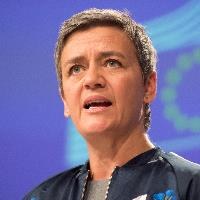(BRUSSELS) – The provisional deal reached between Russian gas giant Gazprom and the EU Monday will enable the free flow of gas in Central and Eastern Europe at competitive prices, says the Commission.
The EU executive is now inviting comments from interested parties on the commitments submitted by Gazprom to address the Commission’s competition concerns as regards gas markets in Central and Eastern Europe.
Competition Commissioner Margrethe Vestager welcomed Gazprom’s commitments, saying they “address our competition concerns and provide a forward looking solution in line with EU rules.” She said they would “help to better integrate gas markets in the region. This matters to millions of Europeans that rely on gas to heat their homes and fuel their businesses.”
The agreement is a provisional one, which the Commission is now putting out to consultation. “We are asking for the views of customers and stakeholders and will carefully consider them before taking any decision,” said Ms Vestager. Views on the commitments need to be submitted within seven weeks of their publication in the Official Journal.
Gazprom is the dominant gas supplier in a number of Central and Eastern European countries. In April 2015, the Commission sent a Statement of Objections expressing its preliminary view that Gazprom had been breaking EU antitrust rules by pursuing an overall strategy to partition Central and Eastern European gas markets.
In the Commission’s view, the commitments offered by Gazprom cover its competition concerns. They help to better integrate Central and Eastern European gas markets, facilitating cross-border gas flows at competitive prices.
In particular, the Commission considers that Gazprom’s commitments meet its objectives regarding each of the competition concerns, namely by ensuring that:
- restrictions to re-sell gas cross-border are removed once and for all and facilitating such cross-border flow of gas in Central and Eastern European gas markets;
- gas prices in Central and Eastern Europe reflect competitive price benchmarks; and
- Gazprom cannot act on any advantages concerning gas infrastructure, which it obtained from customers by having leveraged its market position in gas supply.
Taking into account all comments received, the Commission will then take a final view as to whether the commitments are a satisfactory way of addressing the Commission’s competition concerns.
Country-specific Factsheets that explain how the commitments would benefit each Member State concerned: Bulgaria, the Czech Republic, Estonia, Latvia, Lithuania, Poland, Hungary and Slovakia.


